Ahmeti’s five most notable achievements:
1. Stopping illegal construction in Prishtina
Ahmeti has been applauded by many for taking immediate measures to stop illegal construction in Prishtina. Since the war ended in 1999, over 40,000 buildings* have been constructed in the capital without planning permission from the municipality, leaving the city a mess, without any clear urban plan, and with anybody virtually free to build whatever, wherever they please. The mayor has repeatedly accused the city’s previous LDK administration of allowing illegal building to happen, and of profiting from mafia construction.
Ahmeti has made this issue a top priority from day one, and has made a clear statement of intent by ensuring that municipality inspectors are quick to act on reports of illegal construction.
Bekim Salihu, a researcher at the Institute of Advanced Studies (GAP) that has monitored the performance of Prishtina’s municipality, believes that Ahmeti has already taken some positive steps on illegal construction but that reversing years of damage cannot happen overnight. “What happened with the illegal construction in Prishtina in these 14 years is a consequence of bad governance, corrupted individuals and the consequences will take years and maybe centuries to be fixed,” he told Kosovo 2.0.
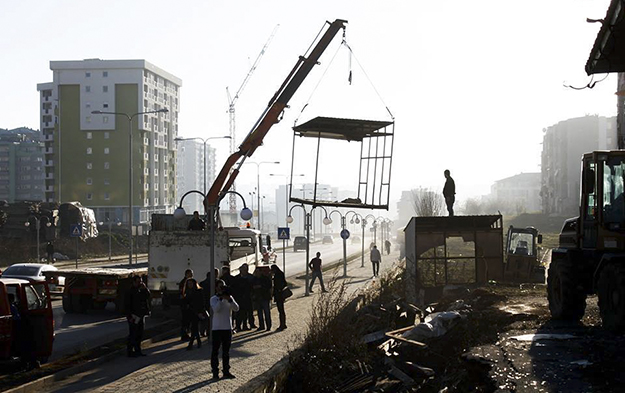
Not everyone has perceived Ahmeti’s measures as a step forward though. The ‘Construction Association’ organized protests, suggesting that his actions have led to the closing of numerous constructions companies, which in turn has left hundreds, or even thousands, of people unemployed. Ahmeti has even reportedly been subject to a plot against his life, but this hasn’t seemed to affect his determination on the issue.
Salihu believes that accusations of forcing the closure of building firms are wide of the mark. “The claims that the people remained jobless after illegal constructions were stopped are immature claims,” he said. In fact, Salihu believes that Ahmeti could have already gone further with his reforms, criticizing him for not taking measures to destroy illegal garages belonging to the Prishtina branch of the Democratic Party of Kosovo (PDK).
Although his resolve to stop illegal construction in Prishtina has caused protests and the loss of jobs, Ahmeti’s action is an important step in reversing the steady degradation of Kosovo’s capital city.
2. Clampdown on corruption
Overlapping with the issue of illegal construction, if there has been one thing that has drawn much attention during the first 20 months of Ahmeti’s governance, it has been the issue of fighting corruption. At the start of his tenure, Ahmeti’s cabinet delivered a host of files to Kosovo’s special prosecution that he claimed infiltrated members of the previous administration in 70 cases of alleged corruption. The files were largely linked to officials enabling illegal building work in Prishtina, as well as taking bribes to retrospectively rubber stamp the construction, but also included other cases.
Last week (Sept. 10) special prosecutor Drita Hajdaraj announced indictments against 11 officials in the department of inspections, relating to cases of illegal construction during the period of 2010-2014. Hajdaraj said that there was sufficient evidence to prosecute the officials for allowing, and benefiting from, incidences of illegal construction in 36 of the slightly more than 50 cases that Ahmeti had submitted files for in this regard.
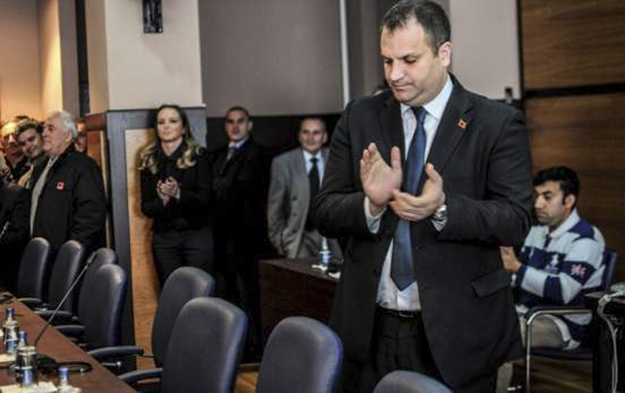
In comparison with what went before him, during the first 20 months of Ahmeti’s governing, no cases of corruption have been reported against municipality officials. “During this period there haven’t been any cases brought against individuals, or other developments, suggesting that the leadership of the municipality allowed, enabled or engaged directly in, corruption,” said Salihu. “This is crucial, because citizens and the business community in Prishtina possess the belief that they can finish their work according to the law, without the need to give bribes.”
3. Enhanced transparency
During the previous administration, the municipality of Prishtina was constantly accused of not being transparent, of making decisions behind closed doors and of appointing directors of schools from individuals affiliated to LDK.
Ahmeti promised transparency while running his electoral campaign in an attempt to be a clean break from the past. In these first 20 months, he has fulfilled many of his promises in this regard, although many also remain a work in progress.
Ahmeti has achieved greater transparency in procurement procedures and the selection of school directors now happens in cooperation with the council of schools and the council of parents. He has also introduced a new system of citizen consultation for the decision making process on local neighborhood policies. Ahmeti has had multiple meetings with Prishtina citizens since he became Prishtina’s premiere, thereby keeping his promise to be open to the views of the public.
The removal of fences outside many public institutions around Prishtina has been a visual representation of his calls for more openness in the municipality’s approach to its citizens. Another symbolic action has been Ahmeti’s keeping of his promise to use public transport.
In other administrative reforms to help make the municipality more accessible to citizens, Ahmeti has made some services available online such as the ability to order a birth certificate, and he has introduced a digitalized queuing system at municipality offices to ensure waiting citizens are seen in turn.
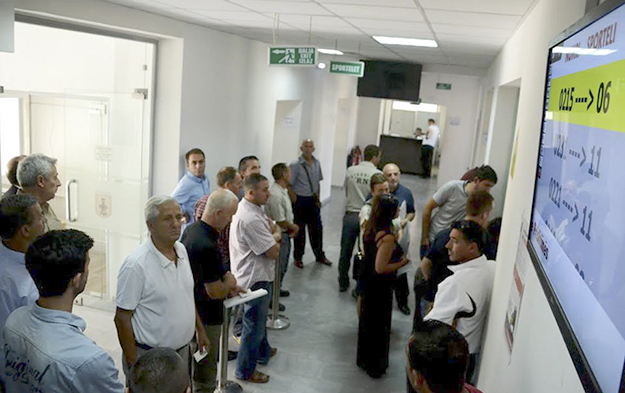
In a recent Kosovo Democratic Institute (KDI) report, Prishtina was assessed as the country’s most transparent city between January and June this year, up from third place this time last year.
However, the mayor has yet to meet his promise to sell the luxurious Audi Q7 car of his predecessor, Isa Mustafa, although that’s not necessarily through any fault of his own. The Assembly of Prishtina did take the decision to sell the car months ago and it has twice been put on the market, but Ahmeti has said that nobody is interested in buying such an expensive car; for now though, it does remain in the garage.
4. “Special care” for children in education
During his election campaign, Ahmeti promised to provide “special” care for children at Prishtina’s schools. Building lockers at schools where children could safely store their heavy bags, systematic health controls for all children in grades one, five and nine, and a portion of food free of charge (croissants) for all children, are some of the main promises that Ahmeti has started to implement since taking office.
The deputy mayor of Prishtina Dardan Sejdiu told Kosovo 2.0 that the reforms have already started to produce tangible results. “At least five children were diagnosed with heart disease and their lives were saved because of medical controls we conducted at schools in Prishtina,” he said. A report in Telegrafi suggested that this number from Sejdiu may even be on the low side, as it suggested that the visits of medics in schools had revealed heart problems with nine school children and a further 76 were apparently found to have cavities.

Ahmeti promised public kindergartens covering all parts of Prishtina. According to Sejdiu, no new public kindergartens had been built for 14 years before Ahmeti took office, whereas the new administration had already opened one within its first 20 months. Sejdiu claims that by the end of the year, a further two more will be ready to open. “We have a model for kindergartens, which we are seeking to spread all over the city,” he said.
However, the way the food portion was distributed to children has been criticized by some on hygienic grounds and in one case a ‘mouse’ was reportedly found in a croissant; the municipality immediately cut cooperation with the contractor in question.
5. Promotion of local products and investment in agriculture
Over the past year and a half, Prishtina’s squares have regularly played host to an array of local products with the mayor having offered more space for local products to be sold.
Sejdiu points out that the municipality has put considerable investment into rural areas within its jurisdiction. “When we came in power, there was a budget of 600,000 euros for the farmers of Prishtina,” he said. “We have doubled the budget in the first year of our governance and now over a million euros is allocated to farmers. When we got the mandate, there were six factory hen plants and now there are 11 because of our support.”
Also, according to Sejdiu, by the end of the month it is expected that new markets selling local products will be opened in nine different locations in Prishtina. Around 450,000 euros worth of subsidies from the European Commission is funding the project of mobile markets that will see more than 100 stalls spring up around the capital.
Despite no clear records having been provided on the economic impact that the measures implemented so far have brought, the message sent has been clear: Ahmeti has set his stall out to back local producers.
Five areas where Ahmeti has not yet achieved:
1. Reducing the year one budget surplus
According to an April 2015 monitoring report by the Initiative for Progress (INPO), Ahmeti has failed in his promise to reduce the municipality’s annual budget surplus; the surplus for 2014 was 2 million euros. That may sound like financial prudence and efficiency, but in reality it points to a lack of effective monetary planning and may be an indicator that intended projects have not been implemented. In the event of an underspend of funds from central government, the unused money must be returned and could be used as justification for cutting the municipality’s budget in future years.
The opposition has been very outspoken about the budget surplus, and the lack of ability to avoid an underspend on such a scale. “The municipality of Prishtina has a necessity for many projects, but the present governance is not capable of using the money,” said Lirak Celaj, head of the PDK group in Prishtina’s assembly, after the huge surplus was forecast in October 2014.
2. Regulating urban traffic
One of the cornerstones of Ahmeti’s election campaign was the issue of regulating the capital’s urban traffic. Poor organization of public transportation, traffic jams and a lack of parking spaces were some of the main problems that Ahmeti identified in his plan for Prishtina.
Deputy Mayor Sejdiu, points out that some steps have been taken in the background and that results will be visible to citizens soon. “The signing [in March this year] of a 10 million euro agreement with the European Bank for Reconstruction and Development (EBRD) will see the first first new buses in Prishtina in the autumn and will start to accomplish Ahmeti’s promise for regulation of urban traffic,” he said. Ahmeti believes that a more effective city transport system will encourage more people to leave their cars at home, thereby alleviating some of the traffic congestion in the city center.
It should be pointed out that it is unrealistic to expect such issues to be fully resolved in less than two years as they are both costly and complex to address. However, until the implementation happens on the ground, the chaos of traffic jams in the city continues.
The new mayor also promised to find a solution to the deficiency of public parking spaces in each of Prishtina’s neighborhoods. If anything though, parking problems for drivers seem to have increased in the capital under Ahmeti’s governance, as the mayor has initiated a campaign of clamping illegally parked vehicles and has inserted bollards to block cars from parking on a number of sidewalks. While this has had a noticeable positive impact for pedestrians, who can more easily walk around the city unimpeded, it has not seemed to have gone hand in hand with a concerted effort to create alternative options for drivers; until now, with a few minor exceptions, there have been limited noticeable steps taken to address such a crucial problem that has long faced the capital’s car owners.
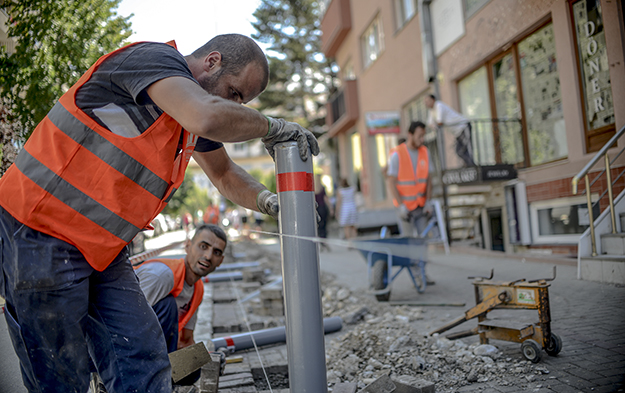
A delegation from Zagreb visited Prishtina in May 2014 to help the municipality with ideas on how to resolve the problems of parking and public transport but to date, little appears to have been put into action.
3. Delivering 24/7 water
The other top priority that Ahmeti spoke much about during his election campaign was delivering 24/7 water within 24 months of his mandate. However today (Sept. 14), almost 20 months later, Ahmeti has announced that he needs an additional 24 months.
The citizens of Prishtina have long suffered problems with their water supply, with residents having to deal with cuts to the supply on a daily basis. Some of the major problems that need addressing are the need to tap into additional sources of water, improving the quality of the infrastructure — it is estimated that more than 50 percent of available water is lost through leaking pipes — and the poor management of payment collection, which leaves the issue under-resourced.
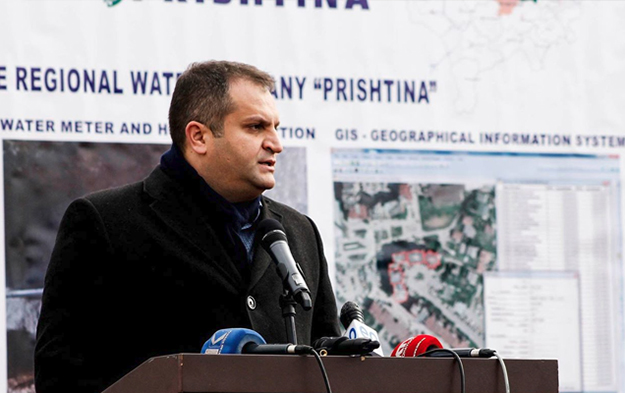
A major project that should help to solve many of Prishtina’s water problems is the ongoing construction of a water plant in Shkabaj that would open up a new water source for the city by supplying water from Gazivoda lake in northern Kosovo. At a cost of 35 million euros, this endeavour is being financed by the German Government, the European Commission, central government and the Municipality of Prishtina. According to Ahmeti’s initial promises, the Shkabaj plant was due to be completed by June 2016, however despite the ground for the factory having been broken in November 2014, it appears that the timescales on the project have slipped.
Other ongoing work to improve the water supply includes a 17 million euro investment in improving the quality of the city’s water pipes, and the opening up of underground wells to feed into the main supply in the areas of Germia, Fushen e Pajtimit and Llukar.
However while all of this work continues, Prishtina’s citizens continue to suffer from an insufficient supply of water, especially during the summer, and Ahmeti’s promise of 24/7 water within 24 months is set to be missed.
4. Ensuring cabinet stability
Mayor Ahmeti has faced considerable problems with maintaining the stability of personnel at the head of the municipality’s departments; since the beginning of his mandate, there have already been six resignations. The latest happened last week when Director of Public Services Ardian Gashi and Director of Property and Finances Driton Berisha both stepped down, citing other professional engagements. Former Director of Education Jusuf Thaci only stayed in the position for the first six months of Ahmeti’s mandate before leaving his role, also due to other professional engagements.
These frequent alternations in the municipality’s departments can seriously harm their functionality and performance as it is not conducive to consistency and long term planning. LDK have accused Vetevendosje of inserting militants into the municipality’s departments and have said that the resignations are one of the greatest failures of Ahmeti’s mayorship so far.
5. Subsidized housing for public sector workers
Ahmeti promised to help solve the housing problems of public sector workers who are struggling to pay rents due to their low incomes compared to those in the private sector. He pledged to build collective buildings with subsidized rents for people who are employed in the public sector, following a model that has been used in Holland, The United States, Canada, and Great Britain. According to Ahmeti, the housing would be funded by international organisations that had expressed an interest in financing such projects. However, no tangible steps have been taken by Ahmeti and this promise seems to have been forgotten, or to have slipped down the priority list.
We have summarized the most noteable achievements, and promises that have not been achieved, during Ahmeti’s first 20 months as mayor of Prishtina; there are many other issues that we have not included here that could fall into either category. It is clear that as mayor, Ahmeti has already taken some significant steps in starting to improve the municipality’s performance in Kosovo’s capital. But despite these promising signs and initiatives, the mayor still has much to do as he approaches the second half of his four year mandate.K
*Editor’s note: This figure has been corrected. The figure of 6,000 that was originally quoted refers to the number of illegal buildings that have been registered in order for their owners to apply for retrospective planning permission. The process of considering retrospective planning permission is expected to begin later this month.







